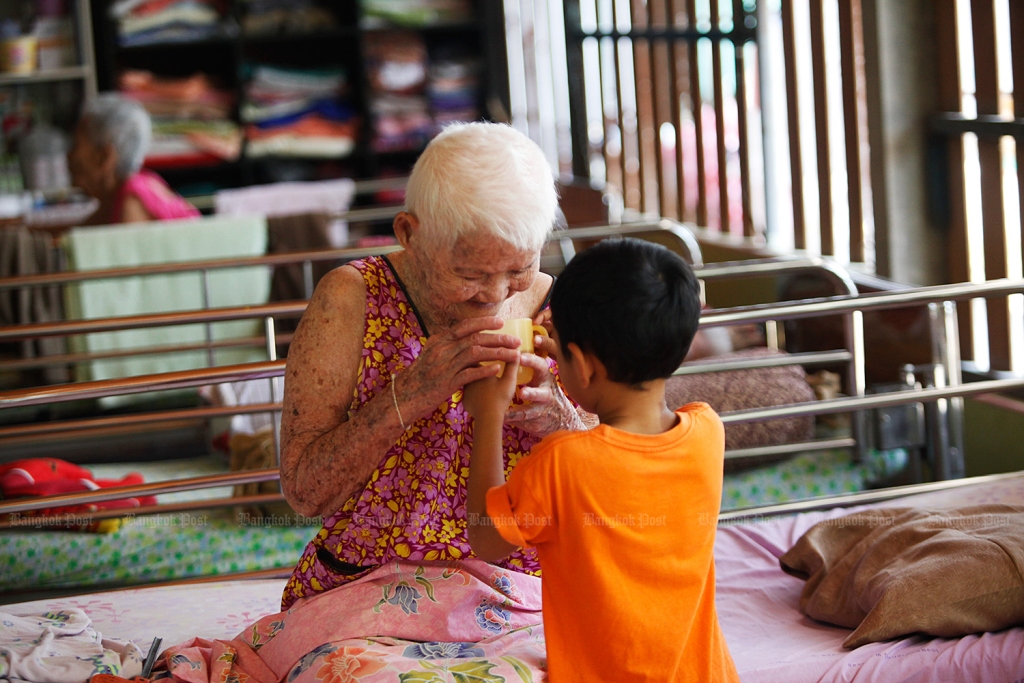The out-going Prayut government has justified new eligibility criteria for the senior allowance, which will replace universal welfare benefits. It claimed that universal welfare payments imposed an undue burden on public budgets.
Following strong criticism, Cabinet Secretary-General Natjaree Ananthasilp stated that the risk of new rules restricting access to assistance was highlighted during a cabinet meeting on Tuesday.
Juti Krairiksh, Minister of Social Development and Human Security (SDHS), informed the meeting that if the previous criteria were not altered, the government would be forced to bear costs of up to 100 billion baht each year beginning in 2025, not to mention other expenses imposed by Thailand’s rapidly ageing society.
Interior Minister Anupong Paojinda signed the new legislation, which was published in the Royal Gazette on Friday. The modifications went into effect on Saturday.
Eligibility for state welfare
Local government agencies used to give universal monthly allowances of 600-1,000 baht to all senior persons under the former legislation, with 600 baht for people aged 60-69, 700 baht for those aged 70-79, 800 baht for people aged 80-89, and 1,000 baht for people aged 90 and more.
According to the new regulations, starting on Saturday, only old persons with no or insufficient income to pay their living expenses will be eligible for the state’s monthly allowance.
However, a transitional condition in the new laws indicates that eligibility for payment does not apply to those who registered for the allowance with local governments prior to August 12, 2023, implying that those who are presently receiving the stipend are unaffected.
Following the meeting, Prime Minister Prayut Chan-o-cha stated that the new criteria are in line with the recommendations of the national committee on the aged.
He emphasised the importance of conservative budget expenditure at this time, but added that if the future government has adequate financial resources, it can make its own spending plans.
“The population of senior citizens is growing. Some people have enough money to survive on, while others do not. “As a result, we must consider how much money we have at our disposal,” Gen Prayut stated.
Mr. Juti stated that the next government will have its own committee review payments for the elderly in detail before implementing the new measures.
“Right now, there are approximately 4 million poor senior citizens.” “With limited budget funds, the government must prioritise assistance to the poor,” he added, adding that the Social Development and Human Security Ministry now receives an annual budget allocation of 8 billion baht.
“If the new government intends to provide a monthly allowance of 3,000 baht, it will have to raise more taxes to fund the policy,” Mr Juti explained.
He stated the 3,000-baht number was based on Move Forward Party campaign promises.
Corruption and graft and welfare money examples
When Prayut overthrew Yingluck Shinawatra’s government on May 22, 2014, he promised to eradicate corruption and tighten down on gambling. Perhaps if this government had kept its promises, there would be enough money to support elderly rather than going into the wallets of corrupt politicians and state bureaucrats.
The Office of Public Sector Anti-Corruption Commission (PACC) reported finding evidence of US$ 3.2 million missing funds from state coffers in 2018, after the Prayut government was hit with a graft scandal involving the misappropriation of 85 percent of funds allocated for the poor and HIV patients.
According to Reuters, the Social Development and Human Security Ministry often distributes the funds to the needy and patients in the form of grants of up to $100.
PACC Secretary-General Korntip Daroj told Reuters that they have “investigated and found corruption-related instances and evidence in about 49 out of 76 provinces.”
General Preecha, Prime Minister Prayut Chan-o-cha’s younger brother, became Thailand’s anti-graft agency’s first charge in 2021.
The National Anti-Corruption Commission (NACC) has accused General Preecha of concealing his assets while serving in the junta-appointed National Legislative Assembly (NLA). The NLA was formed following the May 2014 coup headed by General Prayut.
Secretary-General of the National Anti-Corruption Commission (NACC), Niwatchai Kasemmongkol, said that Thailand scored 36 points, compared to 35 points in the 2021.
He stated that, in the eyes of international investors, the Thai government has become more serious in dealing with the bribery problem and has taken harsh measures against corrupt officials.
According to the personnel in charge of performance evaluation, the Thai government is still unable to combat corruption in government bureaucracy, with endemic fraud among state employees in budget management, conflicts of interest, and lax law enforcement.
Thailand’s corruption standing for 2022 improved nine places to 101st, from 110th out of 180 countries in 2021, according to the 2022 Corruption Perceptions Index by Transparency International. Thailand is 4th among ASEAN countries.






